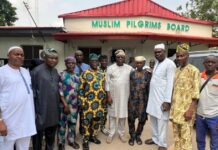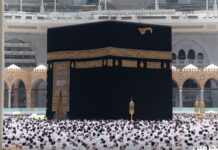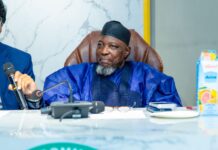Nigerians have a way of turning rumors into legends. Stories travel faster than facts, shaped by suspicion and repetition. From the old boarding school tale of Madam Koi-Koi to the myths of Iliya dan Mai-Karfi, we’ve seen how narratives endure, not because they’re true, but because they feed fear, envy, or intrigue.
Today, the National Hajj Commission of Nigeria (NAHCON) and its chairman Abdullahi Saleh Usman find themselves trapped in a similar legend, the alleged ₦50 billion corruption scandal. It spreads quickly, whispered in corridors and splashed across headlines, yet remains thin on proof and thick with politics, not on evidence but on the potent fuel of mystery and resentment. This narrative, however, is a house built on the sand of allegation, not the concrete of fact.
To grasp the sheer scale of this claim, one must examine the 2025 Hajj finances,
For the 2025 Hajj season, pilgrims from southern states paid approximately ₦8.78m, northern states ₦8.46m per person. Simple division reveals an uncomfortable truth: ₦50 billion divided by the average fare equals roughly 5,747 pilgrims. Meaning someone would need to have collected money from nearly 6,000 pilgrims who never made the journey or diverted 12-13 percent of total Hajj money collected from all pilgrims without leaving a trace.
Such a feat would require extraordinary coordination. Airlines would need to be complicit. Accommodation providers and catering contracts in Saudi Arabia would need to falsify records with phantom invoices. State pilgrim boards must be part of it, each one a separate bureaucracy with its own oversight would all need to look the other way simultaneously.
READ ALSO: IHR lauds Tinubu on Hajj fare reduction order, seeks ₦1,000/$1 concessionary exchange rate
A Presidential order — Reducing the 2026 Hajj Fare
Financial oversight runs from NAHCON’s internal audit to state boards, the National Assembly, and the Presidency. For ₦50bn to vanish, every one of these checkpoints would have to collapse at once a near impossibility.
The system operates through state pilgrimage boards and licensed tour agencies, creating multiple layers of verification. For ₦50 billion to vanish, every single one of these safeguards would need to fail in concert a conspiracy so vast it would have to involve hundreds of people across multiple jurisdictions.
Yet no preliminary audits have flagged such irregularities. No whistleblowers have emerged with documents. No budget statements show unexplained gaps of that magnitude.
What does exist is a pattern familiar to anyone who has watched Nigerian public discourse: A reform-minded official takes office. Changes begin. Entrenched interests feel threatened. And suddenly, a number always large, always round, always just credible enough begins circulating.
“Hatred is gained as much by good works as by evil.” NAHCON’s current leadership has pursued visible reforms, streamlining processes and tightening oversight. Such changes inevitably create winners and losers. Those who benefited from the old system now have motive to undermine the new one. In Nigeria’s charged political environment, an unsubstantiated corruption allegation can be as damaging as a proven one perhaps more so, because fake news requires no evidence to spread.
This is not an argument against accountability. If wrongdoing occurs, it must be investigated thoroughly and transparently. Nigerians deserve institutions that serve them, not plunder them. But they also deserve better than governance-by-rumor, where careers are destroyed and public trust eroded based on whispers rather than facts.
The Economic and Financial Crimes Commission (EFCC) has not publicly presented evidence supporting the ₦50 billion figure. No forensic audit has been released. No specific contracts have been identified as fraudulent. What circulates instead is the allegation itself, repeated until familiarity breeds assumption of truth.
The commission’s actual performance can be measured. Pilgrim numbers are verifiable. Financial statements exist. Contracts are documented. Auditors can examine them. Investigators can follow money trails. These are the tools of accountability not 21st century social media threads, not anonymous allegations, not numbers plucked from the air and given weight through repetition.
Madam Koi-Koi never existed, but generations of students genuinely feared her. The power of a good story lies not in its truth but in its resonance. The ₦50 billion allegation resonates because it confirms what many Nigerians already believe about their institutions: that corruption is everywhere, that officials are always looting, that the system is irredeemable.
But belief, however widespread, is not evidence. And governance cannot be conducted on the principle that every official is guilty until proven innocent, especially when the accusations themselves resist scrutiny.
Let the auditors complete their work. Let investigators follow proper procedures. Let the evidence or its absence speak for itself. And let Nigerians demand both accountability and fairness, recognizing that these principles are not contradictory but complementary.
The truth, whatever it is, deserves better than to be shouted down by legend.
Ganiyu Lamidi is a policy analyst focused on governance and public sector reform in Nigeria.























